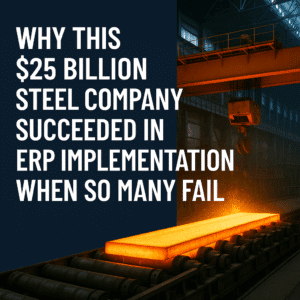There are some really cool emerging trends in today’s digital transformation landscape. Artificial intelligence, machine learning, and predictive analytics are just some of the technologies with potential to completely transform businesses. We cover these and other trends in our top ERP predictions in 2019.
But not all with digital transformation technologies are unicorns and rainbows. There are also pains associated with these emerging tools.
Table of Contents
ToggleThe risk-reward profile of modern digital transformations
Here’s the problem: for the last 20 years, companies have struggled with more vanilla ERP software technologies. The practices and behaviors that led to so many ERP failures will only magnify the challenges of more complex technologies. For example, the SAP failure at Lidl and National Grid’s ERP lawsuit against Wipro involved relatively basic ERP technology.
Deployment of new technology is more complex than ever. On the flip side, when done correctly, these transformations have the potential to deliver larger returns on investment than ERP implementations of years past. In other words, both the risks and rewards of emerging digital transformation technologies are increasing.
What are the risks of digital transformation?
There are a number of risks involved with today’s digital transformations:
Technology risks. First, the technology has become more complex. Despite their benefits, tectonic shifts in technology have disrupted the status quo for CIOs and IT organizations. For example, cloud ERP has reached the tipping point of adoption, which requires a new mindset and approach to technology. There are implications such as less flexibility, less perceived control of not having applications hosted within your four walls, and concerns about data privacy and cybersecurity. Most emerging and advanced tools require more sophisticated skillsets and mindsets that transcend the technology itself.
Operational risks. Traditional business process improvement tactics focus on driving efficiency gains and eliminating pain points. Newer enterprise technologies, however, have the potential to drive more strategic benefits, such as higher revenue, a better customer experience, more innovation, better analytics and more robust business intelligence. But they also entail greater changes and impacts to the status quo, which in and of itself is a big risk. That is why it is important to address business process management at the right time during your digital transformation.
Organizational change risks. The biggest risk is related to people. Even the most sophisticated technologies can’t automate or ease the pain that people will endure during a transformation. More sophisticated technologies require better organizational change management, training and communication. Bigger changes to operations require that same. The fact that organizational change management is typically not handled well during more vanilla ERP implementations – despite being the #1 key to digital transformation success – does not bode well for the success rate of more advanced digital transformations.

How do we properly address the dark side of digital transformation?
The good news? All is not lost. There are some simple strategies to address the risks and rewards of digital transformation initiatives.
Here are some basic strategies to get started:
- Define a clear digital strategy prior to evaluating or implementing technologies. This is the best way to navigate the plethora of options in the market in a way that is aligned with your overarching corporate strategy and objectives.
- Define your business process and operational improvement blueprint prior to implement technologies. Your business processes should drive your technology – not the other way around. Some of our clients have successfully taken this one step further by mapping out process improvements prior to even selecting software.
- Define a super-effective organizational change management strategy and plan. If there’s one thing you do really well in your digital transformation, make it the people side of the equation. And forget technology for a second: none of these advances matter if employees don’t fully commit to and understand the massive changes they are about to experience.
These three recommendations aren’t difficult to implement, but they do require focus. Contact us if you would like to brainstorm how to get your digital transformation started on the right foot. We’re happy to help!





